Running the Salmon Home: Celebrating the Women Leading the Way
This blog is part of a series on the Winnemem Wintu’s Run4Salmon, a two-week long prayerful event and call to action for public awareness about the need to restore the endangered winter-run Chinook salmon to the McCloud River in Northern California. To learn more about the Run4Salmon, read our first post in this series here and our second post here.
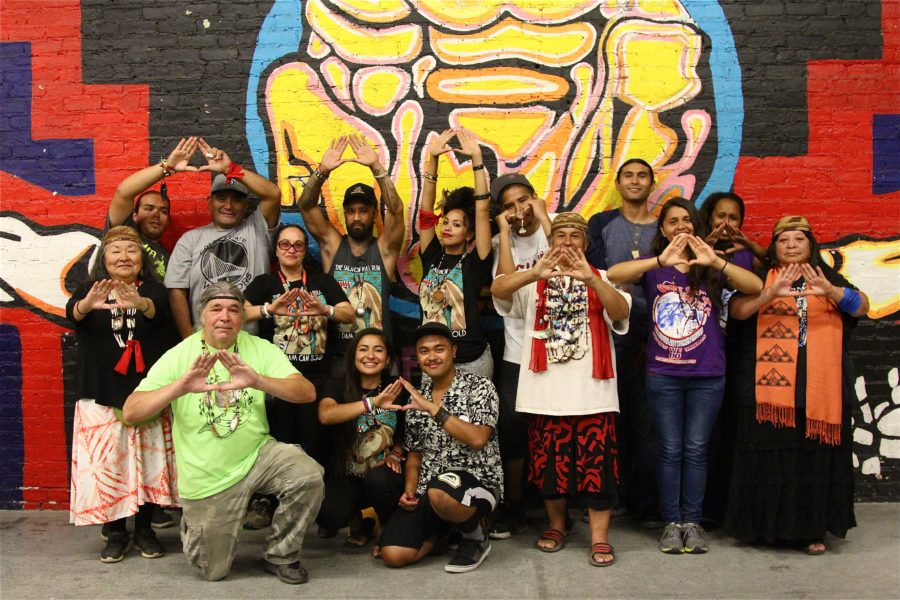
Photo: Toby McLeod
From the historic gathering of Indigenous Nations at the Oceti Sakowin Camp at Standing Rock last year, to women-led grassroots groups organizing environmentally-centered social movements in South Asia; from the Lenca peoples’ effort to obstruct the Agua Zarca Dam alongside Berta Cáceres in Honduras, to West African women working to solve the water crises in their communities, women are at the forefront of environmental movements around the world. As Mohawk elder Katsi Cook teaches, “Women are the first environment.”
For Indigenous communities –– particularly Indigenous women –– this connection between land, body, and community is deeply felt; our previous post about the Winnemem Wintu’s sacred responsibility to Salmon shared that the harm caused by environmental destruction and environmental violence affects both the physical and spiritual health of landscapes and the lives that depend on them, both human and non-human alike.
This is why extractive industries and large-scale infrastructure projects like the Shasta Dam that alter –– and often damage –– indigenous territories are so harmful. The same can be said about the proposed construction of a $1.4-billion, thirty meter telescope at the summit of sacred Mauna Kea, which has activated strong resistance from Native Hawaiians and their allies. It is also why the Dakota Access Pipeline, which cuts through sacred territory and burial grounds of the Standing Rock Sioux and poses an insurmountable threat to clean water sources in the region, led to historic inter-tribal gathering of Indigenous Nations and allies standing together in solidarity as water protectors.
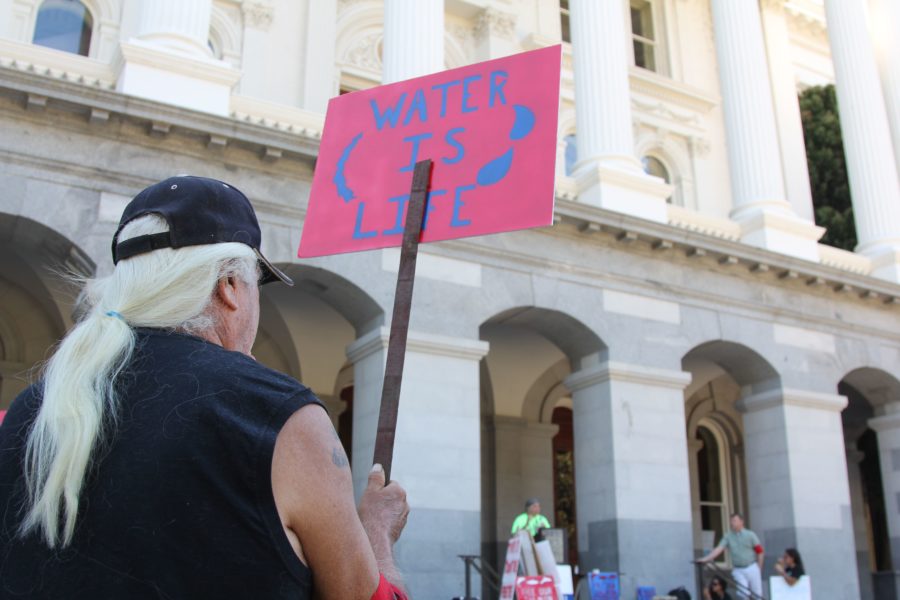
A participant in the 2016 Run4Salmon demonstrates outside the California State Capitol. Photo: Toby McLeod
The relationships and networks that exist between these movements for social change, environmental justice, and Indigenous rights are more visible now than ever before with technology and social media networks emerging as powerful tools for global connectivity. But these ties existed long before online platforms provided the accessibility and ease of information exchange we are used to today; this is work that indigenous communities and women leaders have been doing for centuries.
The Women of the Run4Salmon
“In a way I do this work to honor my ancestors and to fulfill my purpose and my duty on this planet to protect Mother Earth and to protect our waters. If you have a belly button, and if you bleed red, these are your causes too.”
–– Niria Alicia (Xicana), Honor the Earth Fellow
Here in Northern California, women leaders like Chief Caleen Sisk (Winnemem Wintu), Corrina Gould (Confederated Villages of Lisjan/Ohlone), Niria Alicia (Xicana), and Desirae Harp (Mishewal OnastaTis, Diné) are working with a coalition of native and non-native supporters to organize the Run4Salmon, a prayerful journey that highlights the intersectional nature of Indigenous peoples, women, and our collective sacred connection to the environment. During the Run, for example, security teams will be led by women volunteers, and women activists and organizers have been instrumental in guiding this year’s journey.
Widespread support for the Winnemem’s efforts has come pouring in from allies around the world and is visible on the Run4Salmon Instagram, and the movement has also brought together women from many different places and backgrounds, uniting under a common cause for Indigenous rights and environmental and social justice.
Here are a few of the inspirational women leaders involved in the Run4Salmon and other movements for Indigenous rights and Mother Earth:
- Chief Caleen Sisk is the spiritual leader of the Winnemem Wintu. Guided by the mentorship of her great-aunt Florence Jones, who was the Winnemem spiritual leader for 68 years, Caleen has led the tribe’s resistance against the Shasta Dam, as well as their efforts to return to customary Winnemem ceremonies and bring the sacred Winter-run Chinook salmon home to their traditional spawning waters along the McCloud River.
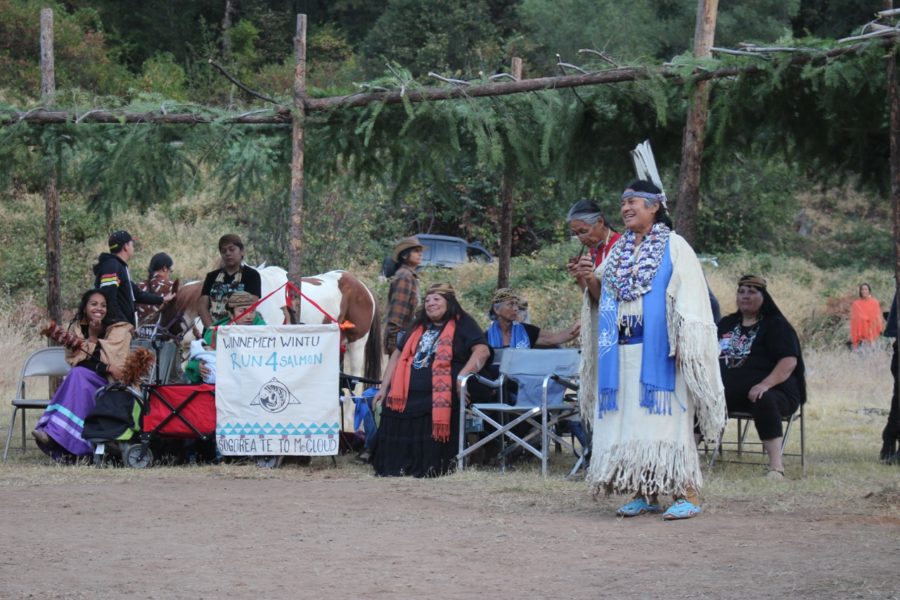
Chief Caleen Sisk at the 2016 Run4Salmon. Photo: Jessica Abbe
- Corrina Gould is the Co-Founder and Lead Organizer of Indian People Organizing for Change (IPOC), an organization working on Indigenous issues in the San Francisco Bay Area. Most recently, IPOC has been facilitating the resistance against proposed development of an ancient Ohlone shellmound site in West Berkeley. Led by Corrina’s guidance, activists recently put forth an alternative proposal for the site, which features a museum, a monument to the Ohlone people and their sacred sites, and would re-surface Strawberry Creek, which was diverted underground during the first developments of the land. As the Run4Salmon begins in Ohlone territory, Corrina has been involved in organizing the opening days of the event, which will include a ceremony at the West Berkeley Shellmound to honor the Ohlone people and their lands.

Corrina Gould at the site of the historic Ohlone shellmound in West Berkeley. Photo: Toby McLeod.
- Pua Case and Hāwane Rios (Kanaka Maoli) are a mother-daughter team whose efforts to protect sacred sites and lifeways in Hawai`i have brought them from Mauna Kea to Mount Shasta, to stand with and sing alongside Indigenous peoples around the world in a collective effort to preserve the mountains and waters that give and support life. Their songs are unforgettable, their message unignorable, as they call for solidarity and strength in the name of aloha ʻāina. They participated in the 2016 Run4Salmon and will be joining the Winnemem again for this year’s run.
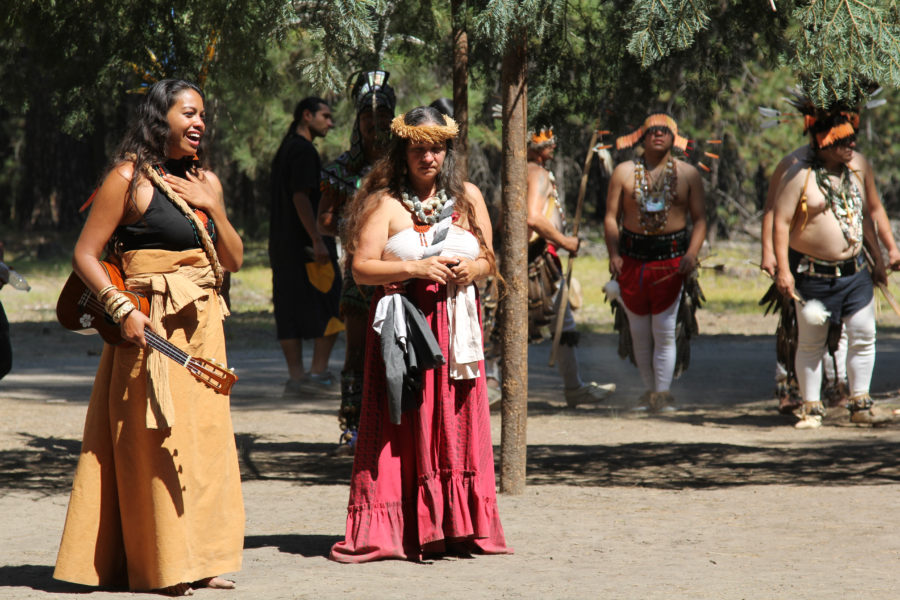
Pua Case and Hāwane Rios at Coonrod, an annual Winnemem Ceremony, in 2015. Photo: Toby McLeod.
- Winona LaDuke is the Executive Director of Honor the Earth, which she co-founded with the Indigo Girls in 1993, and has worked for decades to advocate for the preservation of tribal land claims and traditional Indigenous lifeways. Winona is an environmentalist, activist, and orator, and she has been an active presence in Indigenous movements from Standing Rock to the Run4Salmon.
“It’s the Winnemem Wintu’s right to exist and the right of an ecosystem to live . . . And to stand here with the Wintu is important to my own person, as a spiritual being and a person who is a beneficiary of this ecosystem, and then also because it is this chance to do the right thing.”
–– Winona LaDuke (Anishinaabe), Executive Director of Honor the Earth
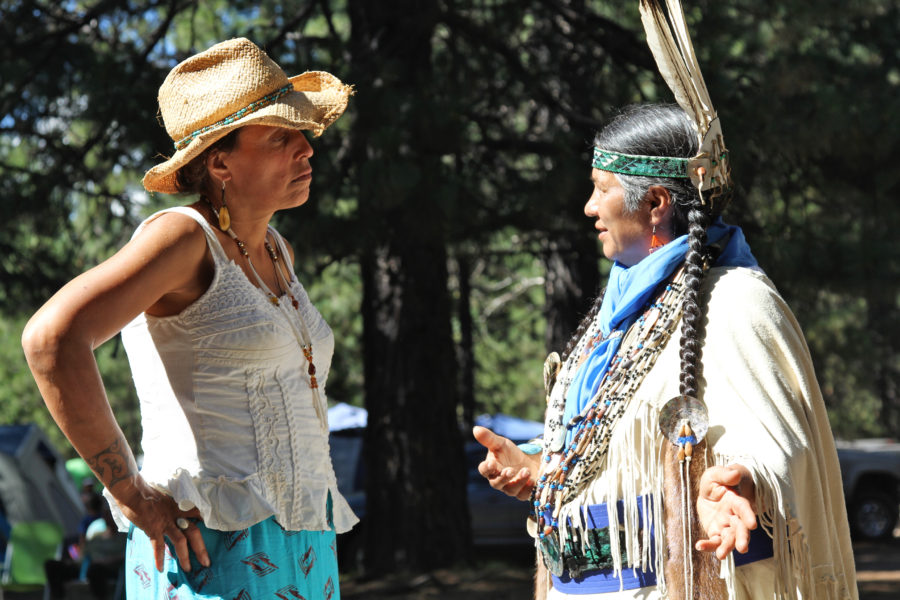
Winona LaDuke and Caleen Sisk. Photo: Toby McLeod.
In a video called “Salmon Will Run,” which was recently released by Nahko and Medicine for the People, the voices of many of these women leaders help us understand the vital importance of supporting efforts like the Run4Salmon and standing in solidarity with movements for the protection of Indigenous peoples rights and lifeways, and the amplification of Native voices everywhere.
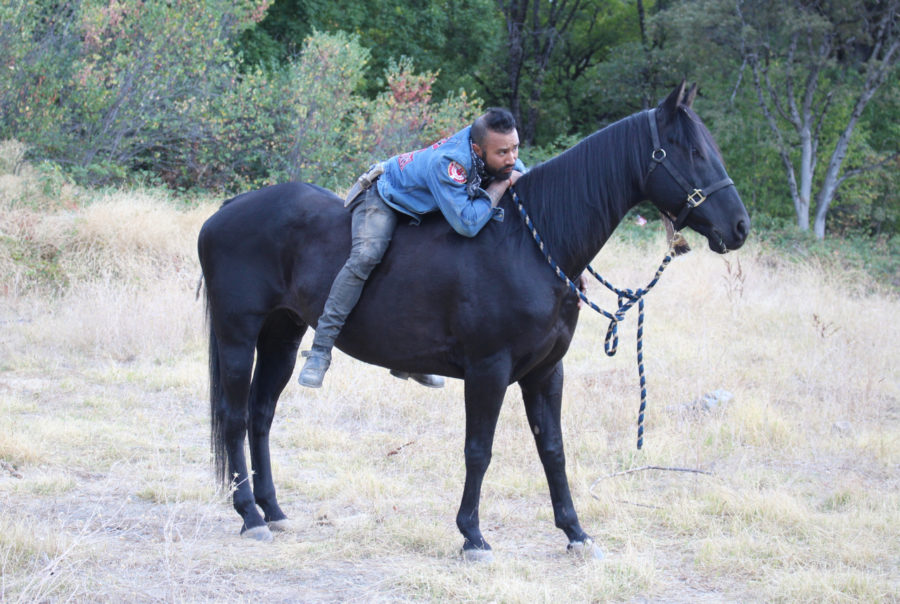
Nahko Bear at the 2016 Run4Salmon. Photo: Jessica Abbe.
For more information on the Run4Salmon, read our previous posts in the Running the Salmon Home series here and here. You can also follow the Run4Salmon journey on Instagram and Facebook.
To learn how you can stand alongside the Winnemem Wintu in their immediate efforts to bring the salmon home, visit here.
The Run4Salmon begins with a Shellmound Ceremony at the West Berkeley Shellmound TOMORROW, September 8th. You can see a full schedule of R4S gatherings and the official itinerary here.
To volunteer for the 2017 Run4Salmon or register to participate in the journey, visit here.
Blog post by Fiona McLeod, WEA Program + Operations Intern
